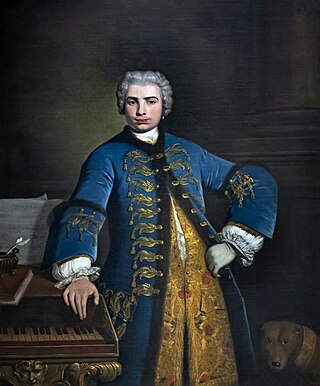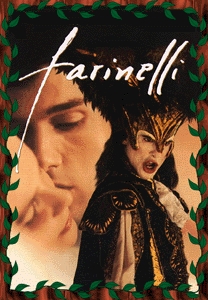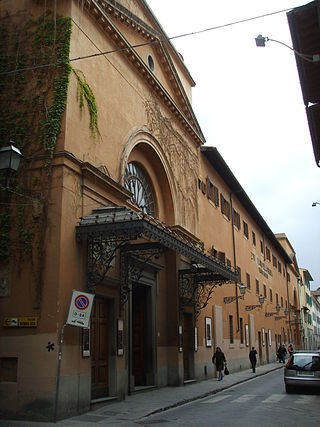
Farinelli was the stage name of Carlo Maria Michelangelo Nicola Broschi, a celebrated Italian castrato singer of the 18th century and one of the greatest singers in the history of opera. Farinelli has been described as having had soprano vocal range and as having sung the highest note customary at the time, C6.

Francesco Bernardi, known as Senesino, was a celebrated Italian contralto castrato, particularly remembered today for his long collaboration with the composer George Frideric Handel.

NicolaAntonio Porpora was an Italian composer and teacher of singing of the Baroque era, whose most famous singing students were the castrati Farinelli and Caffarelli. Other students included composers Matteo Capranica and Joseph Haydn.

Tommaso Michele Francesco Saverio Traetta was an Italian composer of the Neapolitan School. Along with other composers mainly in the Holy Roman Empire and France, he was responsible for certain operatic reforms including reducing ornateness of style and the primacy of star singers.

The Real Teatro di San Carlo, as originally named by the Bourbon monarchy but today known simply as the Teatro (di) San Carlo, is an opera house in Naples, Italy, connected to the Royal Palace and adjacent to the Piazza del Plebiscito. It is the oldest continuously active venue for opera in the world, having opened in 1737, decades before either Milan's La Scala or Venice's La Fenice.

Gaetano Majorano was an Italian castrato and opera singer, who performed under the stage name Caffarelli. Like Farinelli, Caffarelli was a student of Nicola Porpora.

Giuseppe Gazzaniga was a member of the Neapolitan school of opera composers. He composed fifty-one operas and is considered to be one of the last Italian opera buffa composers.

Farinelli is a 1994 internationally co-produced biographical drama film directed by Gérard Corbiau and starring Stefano Dionisi, Enrico Lo Verso, Elsa Zylberstein, and Jeroen Krabbé. It centers on the life and career of the 18th-century Italian opera singer Carlo Broschi, known as Farinelli, considered the greatest castrato singer of all time; as well as his relationship with his brother, the composer Riccardo Broschi.

Roberta Invernizzi is an Italian soprano. She originally studied piano and double bass before turning to singing. She specialises in early music from the baroque and classical period of music.

Catone in Utica is an opera libretto by Metastasio, that was originally written for Leonardo Vinci's 1727 opera. Following Vinci's success, Metastasio's text was used by numerous composers of the baroque and classical eras for their own operas, including Pietro Torri (1736), Antonio Vivaldi (1737), Giovanni Battista Ferrandini (1753) and J. C. Bach (1761).

Antonio Salvi was an Italian physician, court poet and librettist, active mainly in Florence, Italy. He was in the service of the grand-ducal court of Tuscany and the favourite librettist of Prince Ferdinando de' Medici. Salvi was one of the developers of the opera seria.

Semiramide riconosciuta is an Italian opera with serious action, or dramma per musica, by Nicola Porpora, set to a libretto by Metastasio with some textual changes, possibly by Domenico Lalli. The opera was written for some of the finest contemporary singers, and includes a technically demanding series of da capo arias.

Carlo Scalzi was an Italian castrato who had an active performance career in major opera houses in Italy from 1718-1738. He was also heard in London in 1733–1734 where he notably created the role of Alceste in the world premiere of George Frideric Handel's Arianna in Creta. The librettist Pietro Metastasio described Scalzi as a "very unique (sic) singer" and likened his voice to that of the famous castrato Farinelli.
The Real Compañía Ópera de Cámara de Barcelona orchestra (RCOC) is a Spanish early music ensemble based in Barcelona. It was founded by its conductor Juan Bautista Otero. The orchestra has been instrumental in reviving several long unperformed Baroque operas.

Carlo Arrigoni was an Italian composer and musician who was active in several countries during the first half of the 18th century.

Telemaco, ossia L'isola di Circe is a 1718 opera by Alessandro Scarlatti to a libretto by Carlo Sigismondo Capece, court poet to Queen Maria Casimira of Poland, living in exile in Rome, for the Teatro Capranica in Rome, where it was premiered during the carnival season. The opera was revived in 2005 by the Schwetzingen Festival and the Deutsche Oper am Rhein.

Arianna in Nasso is a 1733 opera by Nicola Porpora to a libretto by Paolo Rolli, chief conductor of the Opera of the Nobility.

Polifemo is an opera in three acts by Nicola Porpora with a libretto by Paolo Rolli. The opera is based on a combination of two mythological stories involving the cyclops Polyphemus: His killing of Acis and his blinding by Ulysses.














